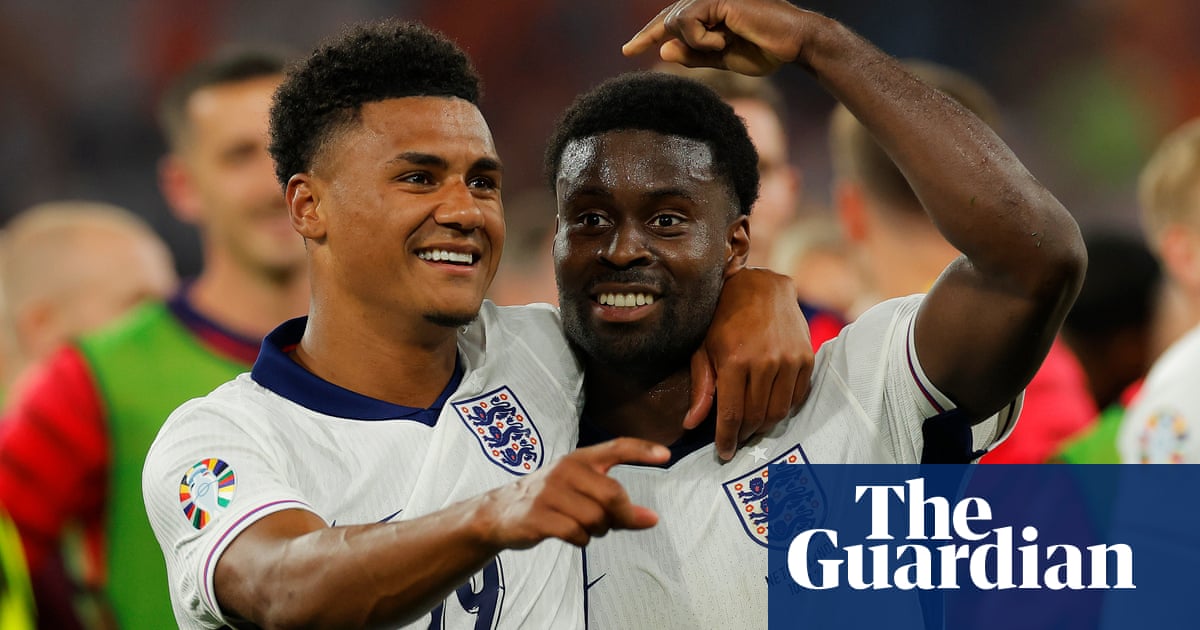Put out more flags. Dig out the George Cross jesterâs hat from behind the sofa. At the end of a Euro 2024 campaign that has seen Englandâs footballers, questioned, written off, and even described in post-watershed terms by respected broadcasters, Gareth Southgate and his team will now contest the final of Euro 2024 in Berlin on Sunday after yet another thrilling moment of late drama in Dortmund.
The Aston Villa striker Ollie Watkins scored the winning goal, playing at his first tournament, on here as a late sub for Harry Kane. With the game poised at 1-1 England and the Netherlands were already staring balefully at the prospect of extra time and beyond that the late-night horror of a semi-final penalty shootout. Watkins had been on the pitch for nine minutes. With his fourth touch of the ball he took a pass from Cole Palmer, another Southgate substitute, turned swiftly and simply hammered the ball low into the far corner.
The BVB Stadion is another of the Rhinelandâs huge lankly industrial metal football hangars. In that moment the ground just exploded, a huge wave of noise barrelling down from the flag-draped red and white end.
As the full-time whistle blew shortly afterwards Watkins crumpled and crouched, breathing hard, his own clear still moment of light. This is a footballer who came up through the levels, who was still trying to get his break at Exeter City when Southgate took over as England manager, and who has now added his own mark to Englandâs baroque tournament history.
Victory here is significant in other ways, not least for the relentlessly resilient Southgate, who has dodged plastic cups and V-signs from his own supporters at this tournament, and who has become a kind of lightning rod for English rage and frustration.
His team will now play in their second successive final in this tournament, extraordinary progress for a nation that had reached one final in its entire history pre-Southgate. Spain will present a daunting obstacle in Berlin. But whatever happens on Sunday, Englandâs reluctant fill-in for a fill-in now has a fair case as Englandâs most successful menâs team manager of all time.
From the start the whole occasion felt big, epic, retro, and always somehow slightly out of control. Dortmund was thronging all afternoon with orange shirts, crackling with broken glass under foot, its winding shopping streets haunted by England songs, England wails and drones and chants. Donât Take Me Home. Phil Fodenâs on Fire, and recent addition to the canon Stop the Boats Nigel Farage, heard here echoing around Düsseldorf Hauptbahnhof.
England fielded their comfortable armchair formation again, the Southgate security truss, three at the back, with the hugely composed Marc Guéhi returning after suspension. They look happier with that extra defensive body, the box of white shirts tighter. Southgate-ism is control and security, the footballing equivalent of a pensive and reassuring frown.
The talk at this tournament had been about gaps. Gaps in the team. Gaps between the manager, fans, media. But there was a window of light in this game as for half an hour in the first half Englandâs young midfielders played like princelings.
The Dutch had taken the lead from a quick turnover, Xavi Simons slamming a shot into the top corner past the flailing palm of Jordan Pickford. The noise came in an extraordinary slingshot from that end as the Dutch players ran to their fans.
No matter. England looked perky, fresh, unafraid. They pushed back and were awarded a penalty with 16 minutes gone, made by Bukayo Sakaâs intricate, slaloming run. Kane buried the kick to make it 1-1.
The sky above the city had turned a lovely Martian red by now, and for a while Foden, Saka and Kobbie Mainoo had the ball on a string, just zipping about, making things up. It was the nicest, sunniest most liberated half an hour of England time so far in Germany. They can play, these boys.
after newsletter promotion
On the touchline the Dutch manager, Ronald Koeman, sank deep into his chair, flaring his jowls, then rejigged his team, reinforcing the Dutch where England were creating the overloads. And half-time just seemed to draw the life out of the game. The Netherlands set themselves defensively to match England, a kind of mass orange-shirted embrace.
On his touchline, Southgate appeared concerned. The waistcoat is long gone now, glimpsed only in the retro cardboard cutouts brandished by Englandâs supporters in bars around the town, like a stag-do memento. At this European Championship, Southgate has gone charity pro-am golf weekend: the lattice-weave cream polo shirt, the skinny black slacks. He stood and frowned and waited.
Patience has been a slow-burn virtue at this European finals tournament. And it was Southgateâs two late subs who won the game here.
Arguably this tournament will now stand as his greatest achievement with England, if only because he has had to overcome two additional things: his own tactical mistakes, and also the absurd white noise around him, anti-support, a self-sustaining cycle of bad news.
That toxicity is a function of wider politics, free-floating rage, an extraordinary few years in the country generally. Southgateâs own politics have faded. He seems a little careworn and bruised. He has been a unique public figure over the past eight years, a kind of beacon of centrist dad-ness, the handsome middle-aged man with the courteous, moderate manner.
He has been such an oddly pervasive public figure, so vividly present. What will he do now if this is to be his final tournament? Run the Football Association perhaps, or became the governmentâs football tsar, the nationâs PE teacher. He could probably spend his time wearing black roll necks and doing TedTalks called Functionalising Your Management Culture Reach.
For now England will face a huge challenge in Berlin on Sunday. But this is an era that has now almost run its course; and with a sense now of a kind of completion.



